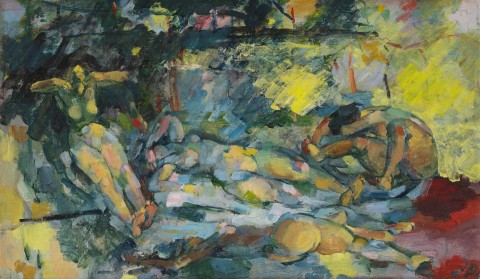GIRL WITH CORN HAIR, c.1952
JOHN PASSMORE
oil on composition board
35.5 x 59.5 cm
signed with initials lower right: JP
signed and inscribed with title verso: Girl with Corn Hair / John Passmore
Private collection, Melbourne
Following his return from Europe in 1951, John Passmore quickly became Sydney’s torchbearer for progressive painting through his teaching roles at Julian Ashton’s, then the National Art School in Sydney. He was a natural teacher, and his outstanding comic talent and pure enthusiasm for painting inspired his students to look beyond the dreary academic brown paintings of the day, toward the European frontier of new painterly possibilities.
Through the artistic turbulence of the 1950s, a gaggle of devoted students, including Peter Upward, William Rose and most notably, John Olsen, hung on his every word, savoured his humour, and indulged his habit of uttering Delphic maxims. In his meandering art classes, his passion for Tintoretto and Rembrandt was often front and centre, but it was Paul Cézanne whose influence gripped the artist early and wove its way through his life’s work, as is clearly evident in the present example. Passmore’s commitment to the advancement of painting expressed through his teaching helped to rekindle an earlier abstract art movement which had flickered out during the Second World War. The earlier generation of abstract painters were formal and analytical, combining bright colour with geometry. In contrast, Passmore’s approach was freewheeling, lyrical and expressive, while constantly returning to the figure and Cezanne as the armature for new truths and values in painting.
The present example, Girl with Corn Hair, as inscribed verso by the artist is slightly misleading, as observation gently reveals that there are in fact four figures delicately embedded into the painting. The figures are so immersed into the surrounding landscape that they are barely discernible. One figurative touchstone which Passmore allows himself in this work are the deftly painted toes on the feet of the figures, which are visual pointers to the human forms and as such, become tiny gateways to the work. Typically, rhythms of light and shade flood his work, his repertoire of greens and yellows flicker and jostle as they compete for prominence. A dappled light falls across the work which adds to the idle, languid scene. No area of the painting is given more importance than another, and in this regard the synergy between the figures as subject and landscape as ground is crucial to Passmore’s attempts to create a culminated structure in his work. As John Olsen reflecting on Passmore says ‘…He spoke of his desire to create a work which… following Dylan Thomas’s suggestion of the sympathy between man and his environment he could find a way of becoming one with the natural forms he painted.’1
Today he is remembered as an elfin-like guru, a pied piper of fractured surface painting whose influence lives on through generations of lyrical abstract painters. Murray Bail, writing for Passmore’s 1984 – 85 retrospective at the Art Gallery of New South Wales remembers, ‘Gradually over time everything fell away, even his Christian name. Unlike Arthur, Lloyd, Sid, Fred … he became known simply as Passmore. It seemed entirely appropriate, fitting the fact of his isolated shape which had become smaller and tighter. Passmore himself referred to himself as ‘Passmore’.’2
1. Olsen, J., Wrobel tapes 11, 10 March 1984
2. Bail, M., ‘Passmore’s Isolation’, addendum to Pearce, B., John Passmore 1904 – 84, Retrospective, Art Gallery New South Wales, Sydney, 1985
HENRY MULHOLLAND
